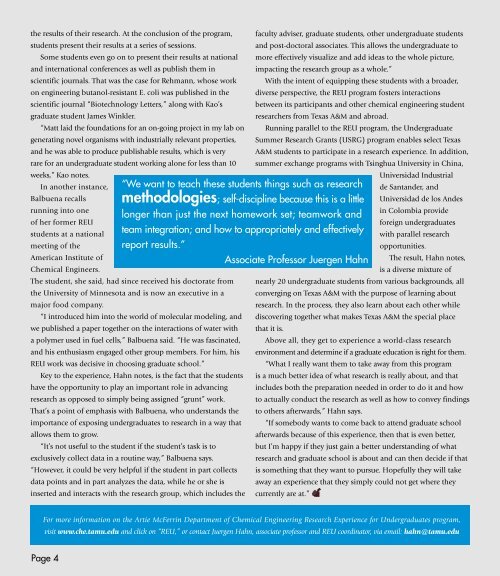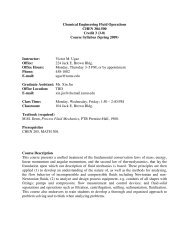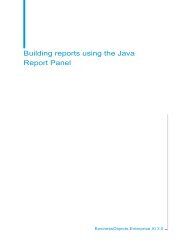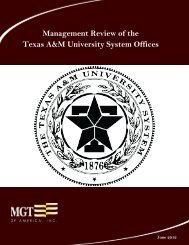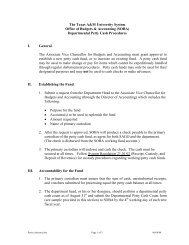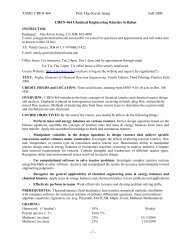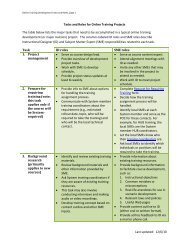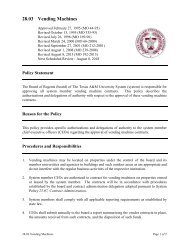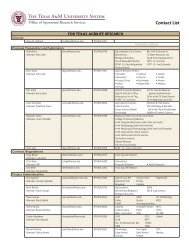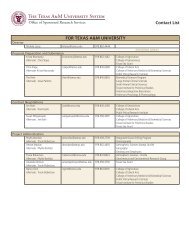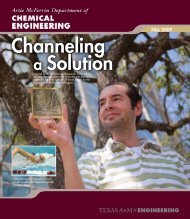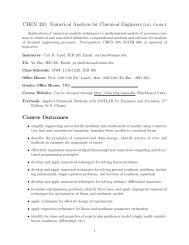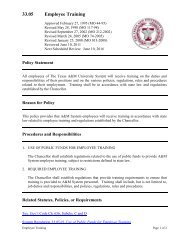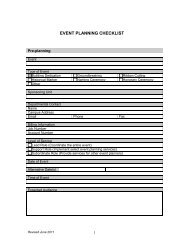Spring 2011 - Department of Chemical Engineering - Texas A&M ...
Spring 2011 - Department of Chemical Engineering - Texas A&M ...
Spring 2011 - Department of Chemical Engineering - Texas A&M ...
You also want an ePaper? Increase the reach of your titles
YUMPU automatically turns print PDFs into web optimized ePapers that Google loves.
the results <strong>of</strong> their research. At the conclusion <strong>of</strong> the program,<br />
students present their results at a series <strong>of</strong> sessions.<br />
Some students even go on to present their results at national<br />
and international conferences as well as publish them in<br />
scientific journals. That was the case for Rehmann, whose work<br />
on engineering butanol-resistant E. coli was published in the<br />
scientific journal “Biotechnology Letters,” along with Kao’s<br />
graduate student James Winkler.<br />
“Matt laid the foundations for an on-going project in my lab on<br />
generating novel organisms with industrially relevant properties,<br />
and he was able to produce publishable results, which is very<br />
rare for an undergraduate student working alone for less than 10<br />
weeks,” Kao notes.<br />
In another instance,<br />
Balbuena recalls<br />
running into one<br />
<strong>of</strong> her former REU<br />
students at a national<br />
meeting <strong>of</strong> the report results.”<br />
American Institute <strong>of</strong><br />
<strong>Chemical</strong> Engineers.<br />
The student, she said, had since received his doctorate from<br />
the University <strong>of</strong> Minnesota and is now an executive in a<br />
major food company.<br />
“I introduced him into the world <strong>of</strong> molecular modeling, and<br />
we published a paper together on the interactions <strong>of</strong> water with<br />
a polymer used in fuel cells,” Balbuena said. “He was fascinated,<br />
and his enthusiasm engaged other group members. For him, his<br />
REU work was decisive in choosing graduate school.”<br />
Key to the experience, Hahn notes, is the fact that the students<br />
have the opportunity to play an important role in advancing<br />
research as opposed to simply being assigned “grunt” work.<br />
That’s a point <strong>of</strong> emphasis with Balbuena, who understands the<br />
importance <strong>of</strong> exposing undergraduates to research in a way that<br />
allows them to grow.<br />
“It’s not useful to the student if the student’s task is to<br />
exclusively collect data in a routine way,” Balbuena says.<br />
“However, it could be very helpful if the student in part collects<br />
data points and in part analyzes the data, while he or she is<br />
inserted and interacts with the research group, which includes the<br />
faculty adviser, graduate students, other undergraduate students<br />
and post-doctoral associates. This allows the undergraduate to<br />
more effectively visualize and add ideas to the whole picture,<br />
impacting the research group as a whole.”<br />
With the intent <strong>of</strong> equipping these students with a broader,<br />
diverse perspective, the REU program fosters interactions<br />
between its participants and other chemical engineering student<br />
researchers from <strong>Texas</strong> A&M and abroad.<br />
Running parallel to the REU program, the Undergraduate<br />
Summer Research Grants (USRG) program enables select <strong>Texas</strong><br />
A&M students to participate in a research experience. In addition,<br />
summer exchange programs with Tsinghua University in China,<br />
Universidad Industrial<br />
de Santander, and<br />
Universidad de los Andes<br />
in Colombia provide<br />
foreign undergraduates<br />
with parallel research<br />
opportunities.<br />
The result, Hahn notes,<br />
is a diverse mixture <strong>of</strong><br />
nearly 20 undergraduate students from various backgrounds, all<br />
converging on <strong>Texas</strong> A&M with the purpose <strong>of</strong> learning about<br />
research. In the process, they also learn about each other while<br />
discovering together what makes <strong>Texas</strong> A&M the special place<br />
that it is.<br />
Above all, they get to experience a world-class research<br />
environment and determine if a graduate education is right for them.<br />
“What I really want them to take away from this program<br />
is a much better idea <strong>of</strong> what research is really about, and that<br />
includes both the preparation needed in order to do it and how<br />
to actually conduct the research as well as how to convey findings<br />
to others afterwards,” Hahn says.<br />
“If somebody wants to come back to attend graduate school<br />
afterwards because <strong>of</strong> this experience, then that is even better,<br />
but I’m happy if they just gain a better understanding <strong>of</strong> what<br />
research and graduate school is about and can then decide if that<br />
is something that they want to pursue. Hopefully they will take<br />
away an experience that they simply could not get where they<br />
currently are at.”<br />
“We want to teach these students things such as research<br />
methodologies; self-discipline because this is a little<br />
longer than just the next homework set; teamwork and<br />
team integration; and how to appropriately and effectively<br />
Associate Pr<strong>of</strong>essor Juergen Hahn<br />
For more information on the Artie McFerrin <strong>Department</strong> <strong>of</strong> <strong>Chemical</strong> <strong>Engineering</strong> Research Experience for Undergraduates program,<br />
visit www.che.tamu.edu and click on “REU,” or contact Juergen Hahn, associate pr<strong>of</strong>essor and REU coordinator, via email: hahn@tamu.edu<br />
PROSPEC ING IN AGGIELAND<br />
Thanks to Pr<strong>of</strong>essor Mark Holtzapple and a <strong>Texas</strong> A&M<br />
open-house event known as “Aggieland Saturday,” prospective<br />
students got a glimpse into the impact chemical engineering<br />
can make on issues <strong>of</strong> global importance.<br />
For the prospective chemical engineering students touring the<br />
campus this past February as part <strong>of</strong> an annual open-house event,<br />
the message from Pr<strong>of</strong>essor Mark Holtzapple was clear:<br />
Some <strong>of</strong> the most critical issues facing the world’s everburgeoning<br />
population are being addressed by chemical<br />
engineers – across the globe and at <strong>Texas</strong> A&M University.<br />
From energy and environmental issues to overcoming disease<br />
and thwarting terrorism,<br />
chemical engineers play a<br />
larger role than ever, said<br />
Holtzapple, addressing<br />
the group, which largely<br />
consisted <strong>of</strong> high school<br />
students and their parents<br />
as well as transfer students.<br />
The group converged<br />
on campus for “Aggieland<br />
Saturday,” a universitywide<br />
open house created<br />
to help prospective<br />
students and their families<br />
learn about the opportunities<br />
available at <strong>Texas</strong> A&M. Dr. Mark Holtzapple<br />
Through the program, the<br />
university opened its doors to an estimated 10,000 prospective<br />
students, including those with aims at pursuing a chemical<br />
engineering education.<br />
While on campus, participants met current students, toured<br />
residence halls and visited libraries and computer labs – all in an<br />
attempt to gain a better understanding about what <strong>Texas</strong> A&M<br />
has to <strong>of</strong>fer. They also had the opportunity to learn more about<br />
<strong>Texas</strong> A&M’s academic colleges and the majors they <strong>of</strong>fer. In<br />
addition, a variety <strong>of</strong> group sessions provided information about<br />
admissions, financial aid, student services, student organizations,<br />
and student traditions.<br />
Sponsored by The Association <strong>of</strong> Former Students, the event,<br />
which was free to attend, featured interactive demonstrations,<br />
campus tours, and several other activities that enabled<br />
participants to focus on their particular areas <strong>of</strong> interest.<br />
Those students with chemical engineering interests visited the Jack<br />
E. Brown <strong>Engineering</strong> Building – home <strong>of</strong> chemical engineering at<br />
<strong>Texas</strong> A&M – and soon found themselves immersed in a discussion<br />
about the world’s energy supplies with Holtzapple, pr<strong>of</strong>essor in the<br />
Artie McFerrin <strong>Department</strong> <strong>of</strong> <strong>Chemical</strong> <strong>Engineering</strong>.<br />
And for those students, there may not have been a more<br />
appropriate person with whom to have that discussion. Few people<br />
are as well-versed on energy issues as Holtzapple, who has devoted<br />
more than 30 years <strong>of</strong> his career to issues <strong>of</strong> energy sustainability.<br />
Through his research, he’s now on the cusp <strong>of</strong> <strong>of</strong>fering a<br />
solution to one <strong>of</strong> society’s biggest energy-related issues – helping<br />
to alleviate the nation’s dependence on foreign oil by developing a<br />
process that, quite simply,<br />
turns trash into gas.<br />
More specifically,<br />
the process produces<br />
renewable gasoline from<br />
biomass — any feedstock<br />
including, trees, grass,<br />
manure, sewage sludge,<br />
garbage, agricultural<br />
residues, and energy crops.<br />
Detailing that process,<br />
Holtzapple impressed<br />
upon the group the need<br />
for innovative ideas<br />
grounded in an understanding <strong>of</strong> the geopolitical framework<br />
that is shaping their lives.<br />
For instance, Holtzapple noted, the United States spends an<br />
astonishing $400 billion a year importing foreign oil. It doesn’t<br />
have to be that way, he said, using his own work as an illustration<br />
<strong>of</strong> how chemical engineering can make a positive impact.<br />
Further illustrating that point, Holtzapple also reviewed his<br />
work with the city <strong>of</strong> Laredo, <strong>Texas</strong> – work that has resulted in a<br />
fully functioning desalination pilot plant. Utilizing Holtzapple’s<br />
method to more efficiently desalinate water, the new pilot plant<br />
will provide data to help design next-generation desalination<br />
plants that can potentially help the city <strong>of</strong> Laredo, which is<br />
near the limit <strong>of</strong> water it can draw from the Rio Grande River to<br />
support its 200,000 citizens.<br />
Overall, it was an excursion into the realm <strong>of</strong> chemical<br />
engineering that was as much about impact as it was innovation,<br />
as much about solutions as it was science – not a bad starting<br />
point for many <strong>of</strong> these potential chemical engineers.<br />
Page 4 Page 5


